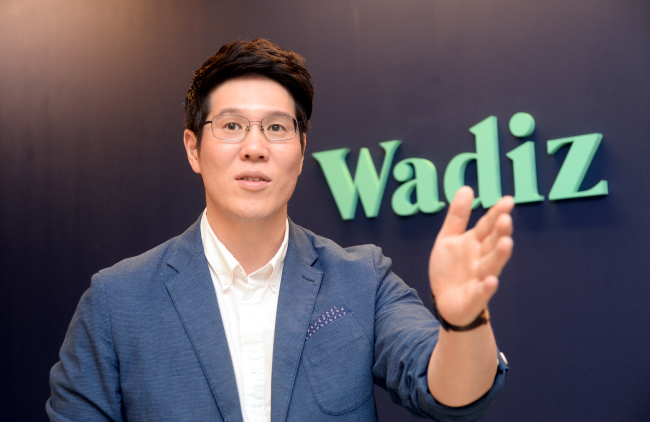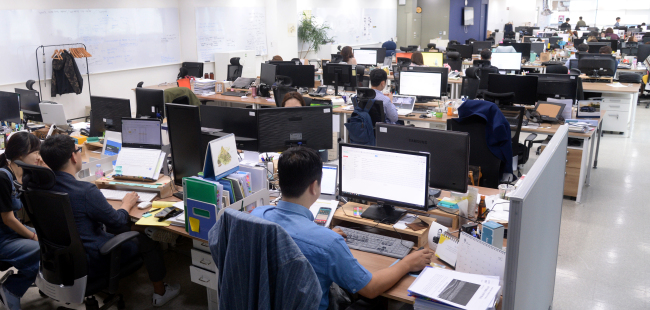The Korea Herald is publishing a series of interviews on promising startups in the fintech industry. This is the 3rd installment. -- Ed.
The culture of crowdfunding is belatedly, yet significantly permeating through venture startups in South Korea, as the number of patient investors begin to increase, looking for a sense of accomplishment beyond immediate profits.
Behind the trend is Korea’s longest-standing crowdfunding platform Wadiz, whose chief executive says the link that had been missing -- trust -- is in the process of being formed here.
“In the past in Korea, consumer values were mostly framed by local retailers and stock brokerages and induced traditional consumers to hunt for bargains and high-yield stock portfolios,” said Shin Hye-sung, chief executive of Wadiz, in an interview with The Korea Herald.
 |
Wadiz Chief Executive Shin Hye-sung (Park Hyun-koo/The Korea Herald) |
“Beyond price, (Wadiz) believed there were other factors that a consumer would respond to, like a sense of sympathy,” the 38 year-old stock analyst-turned-CEO said.
It is widely perceived that the lackluster growth of startups here has been due to a mismatch of startups in need of consistent capital influx for growth. Venture capital firms and family-owned conglomerates have largely snubbed the startups despite the potential of the fledgling businesses that have completed the research and development stage.
“We have redefined capital built on trust by individual consumers,” Shin said.
Headquartered in Pangyo Techno Valley, southern Gyeonggi Province, Wadiz has proved the most successful online crowdsourcing platform here, with a combined 9.2 billion won ($8.1 million) in volume in the first three quarters of 2017, a 50 percent increase from last year’s volume.
Some of their famous crowdfunding cases include the epochal 26-minute target-raised crowdfunding for documentary “Our President,” which sparked nationwide nostalgia for the late president Roh Moo-hyun and secured enough screens nationwide to become a relative blockbuster.
Others have included wave energy converter maker Ingine and handmade car producer Mohenic Garages.
Behind such successful investments is Wadiz’s attention to not just what investors should be investing in, but who the investors are, and giving them a sense of purpose.
“If we were to just reap profits, we would not be in such a business,” Shin said, explaining the philosophy in running Wadiz is to target those seeking to see their investees succeed.
For instance, Wadiz dubs individual investors as “trust capitalists,” offering them a chance to go for the ideas they like most, which Shin said lay beyond traditional consumer value.
It has also cultivated social capitalism through its own research and development center and its series of lectures from “Wadiz School,” both online and offline, based on analyses of some 3,000 cases of crowdfunding to help guide investors.
The investors on the grounds of social capitalism do not really know when a firm they invest in will begin to yield returns. But they would put in their money and wait and watch the firm or project grow, like scores of projects have, he said.
 |
An interior view of Wadiz office in its headquarters in Pangyo Techno Valley, Gyeonggi Province (Park Hyun-koo/The Korea Herald) |
Founded in May 2012, Wadiz has offered both equity crowdfunding and rewards-based crowdfunding. The fintech startup began to take to equity crowdfunding in January 2016, when the FSC granted five startups business approval for equity crowdsourcing industry. One has since had the approval revoked.
Over the past 5 1/2 years, Shin saw Wadiz grow 25 times over in terms of workforce. Wadiz takes up 41.5 percent of market share in the equity crowdfunding market, where eight startups and six equity firms compete, according to data from the Korea Securities Depository in October.
Wadiz also eyes overseas business in Southeast Asia and believes the firm would have the upper edge against non-Asian crowdfunding business entities, citing its “experience of changing individual consumers’ awareness,” according to Shin.
Wadiz had a nearly 60 percent crowdfunding success ratio, as 80 of 143 firms were able to get their projects going with 80 percent of the initial goals funded by the deadline, according to data from the FSC as of June.
South Korea is increasingly becoming crowdfunding-friendly, as lawmakers have scrambled to ease regulations on crowdfunding platforms, which Shin said is a “good sign.”
The revision bill of the Financial Investment Services and Capital Markets Act, passed on Sept. 28, allows an investor to individually buy equities of firms worth by maximum 10 million won, double that of the previous upper cap. Also, crowdfunded startups would be able to release advertisements outside crowdfunding platforms, previously banned by guidelines set out by the Financial Services Commission.
But Shin noted that more could be done to promote crowdfunding that is key to fostering innovative industries.
In return for giving up on chances to seek instant profit and instead turning to patience-involving investment, the Wadiz investors should get a tax deduction, Shin said.
“Without such motivation, the investors would yet again flock to high-yield products such as real estate investments, which is no good for either the buyers or the national economy as a whole,” he said.
By Son Ji-hyoung
(
consnow@heraldcorp.com)








![[Today’s K-pop] Blackpink’s Jennie, Lisa invited to Coachella as solo acts](http://res.heraldm.com/phpwas/restmb_idxmake.php?idx=644&simg=/content/image/2024/11/21/20241121050099_0.jpg)
